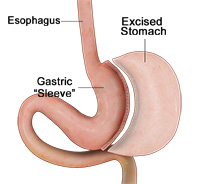Sleeve Gastrectomy
Sleeve gastrectomy, also referred to as vertical sleeve, gastric sleeve or tube gastrectomy, is a surgical procedure performed for the treatment of obesity. The procedure is a restrictive bariatric surgery to treat extremely obese patients with a high BMI of 40 and above. It encourages weight loss by restricting the stomach size, so it holds only a limited amount of food. This helps patients to eat less without hampering the normal digestive process.

Sometimes sleeve gastrectomy is carried out as a first stage of a two-stage operation in extremely obese patients with a BMI of 60 or more. This is done to achieve a considerable amount of weight loss, so it is safer for the patient to undergo a second bariatric surgery if needed.
What Happens During a Laparoscopic Sleeve Gastrectomy Procedure?
The procedure is performed under general anesthesia. The surgeon makes 2 to 5 small incisions on your abdomen. A laparoscope, a thin instrument with a light and camera attached, is inserted through one incision, allowing your surgeon to clearly view the internal organs on a monitor.
Additional surgical instruments are inserted through the other incisions. Your surgeon will remove nearly 75-80% of the stomach. A thin sleeve shaped like a banana is created by stapling the remaining part of the stomach. At the end of the procedure, the incisions are closed with sutures. The entire procedure takes about 60 to 90 minutes to complete.
Advantages of Sleeve Gastrectomy Surgery
- Reduced stomach volume increases feeling of fullness
- Stomach functions normally allowing most foods to be eaten, just in smaller amounts
- Stomach portion that produces hunger stimulating hormone (Ghrelin) is removed.
- No dumping syndrome due to pyloric portion of stomach is left intact
- No intestinal bypass and its associated risks
- Can be performed laparoscopically
- Simpler procedure than gastric bypass
- Safer first stage procedure of two stage surgery for super morbidly obese
- Less operative time than bypass surgeries
- Less hospital stay than bypass surgeries
- No foreign bodies used such as in band surgery
Disadvantages of Sleeve Gastrectomy Surgery
- Potential is higher for inadequate weight loss or weight regain compared to intestinal bypass surgeries.
- Irreversible
- Considered investigational by some surgeons and insurance companies
- Considered a temporary treatment for obesity unless second stage (bypass) is performed
- Potential for dilation of the sleeve affecting weight loss
- Long term results have not been evaluated
Postoperative Care
Your doctor will prescribe pain relieving medications to keep you comfortable following the procedure.
- You will be advised to take medication to reduce the amount of acid produced by your stomach.
- Avoid strenuous exercises and lifting heavy weights until approved by your surgeon
- For the first month after the procedure, eat only small amounts of soft foods
- Sip water throughout the day to prevent dehydration.
- Eat a highly nutritious diet rich in proteins with a low-fat content.
- Your dietitian will tailor a new diet regimen for you to follow.
Risks & Complications
As with any surgery there are potential risks involved. The decision to proceed with the surgery is made because the advantages of surgery outweigh the potential disadvantages. It is important that you are informed of these risks before the surgery takes place. Most patients do not have complications after sleeve gastrectomy surgery; however, complications can occur and depend on the patient's health status.
Complications can be medical (general) or specific to sleeve gastrectomy.
Medical complications include those of the anesthesia and your general wellbeing. Almost any medical condition can occur, so this list is not complete. Complications include:
- Allergic reaction to medications
- Blood loss requiring transfusion with its low risk of disease transmission
- Heart attack, strokes, kidney failure, pneumonia, bladder infections
- Complications from anesthesia
- Serious medical problems can lead to ongoing health concerns, prolonged hospitalization, or rarely death. (less than 1% cases)
Specific complications for sleeve gastrectomy surgery include:
- DVT (blood clot in the deep leg veins)
- Damage to adjacent organs
- Leakage of digestive contents from the staple line can lead to serious infection


